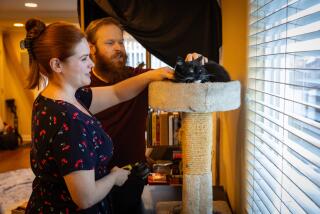Fatherhood depletes testosterone, study finds
Hormonally speaking, becoming a father may make you less of a man, according to new research that finds testosterone levels drop in men after they become parents. But fear not for manhood — the results show that men are evolutionarily wired to help raise their children and that testosterone may get in the way, scientists say.
Testosterone is a hormone associated with perceived hallmarks of masculinity such as libido, aggression and musculature. Those can be useful qualities when competing for a mate, but less so when raising a child — an endeavor that requires calm, attentiveness and an even temper.
Some studies over the last decade had shown that fathers have lower testosterone levels than their childless counterparts. But it remained unclear whether fatherhood itself was responsible for the decline or if men with less testosterone were more likely to settle down and become fathers in the first place.
To answer the question, scientists measured the testosterone levels of 624 Philippine men who were 21 years old. The researchers tracked the men — and their hormones — over the next 4.5 years. During that period, 162 who were single at the start of the study settled down and had kids and 257 remained single and childless.
The data revealed that the men with higher testosterone levels at the start of the study were more likely to become fathers. But these dads saw their testosterone levels plummet by 26% upon waking and by 34% at bedtime over the course of the study. Compare that to the bachelors, who saw modest age-related declines of 12% and 14%.
For fathers, the initial drop was abrupt: Men with newborns saw T-levels dive by 43% in the morning and 49% in the evening during the baby’s first month of life. As their infants grew, their hormone levels recovered — men with babies between the ages of 1 and 12 months took a testosterone hit of only 23% in the morning and 35% in the evening.
Overall, men who devoted the most time to child care had the lowest testosterone levels, according to the study, which was published online Monday by Proceedings of the National Academy of Sciences.
“There’s something about being an active father that’s contributing to these dramatic declines,” said study leader Lee Gettler, a biological anthropologist at Northwestern University in Evanston, Ill.
The results support the idea that testosterone levels aren’t static but respond to a man’s behavior and cues from his cultural environment, said Peter Ellison, an evolutionary biologist at Harvard University who was not involved in the study.
Ellison pointed to a 2008 paper he co-wrote, in which he and colleagues documented the very different parenting styles of men in two neighboring groups living around Lake Eyasi in northern Tanzania, the Hadza and the Datoga. Hadza men were ideal fathers in many ways, Ellison said: They carried, cleaned, fed and pacified their infants and slept around the same hearth as their children.
The Datoga, on the other hand, considered child-rearing to be women’s work, so they rarely interacted with their infants and slept and ate separately from their wives.
Those opposing views of fatherhood were mirrored in the men’s hormones. The Datoga fathers’ testosterone levels were no different from those of their childless peers. Among the Hadza, however, fathers registered levels that were 30% lower in the morning and 47% lower in the evening than for men who weren’t raising children.
The study was the first to show that a father’s role in child care was directly linked to testosterone production.
The head-scratcher for the modern male: Does being a good parent drain the manhood right out of you?
For what it’s worth, researchers suggested that a dad’s testosterone is likely to bounce back as his children mature and become self-sufficient.
Regardless, Ellison quashed such neuroses about fatherhood.
“It makes you a man,” he said. “It’s what men are supposed to do.”
The findings, Ellison explained, put humans squarely in line with other mammal and avian species that devote considerable time and effort to raising their young. “We’ve evolved to be good fathers,” he said.







